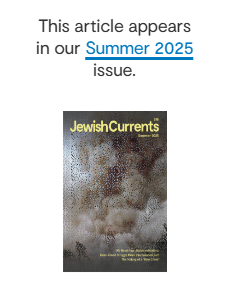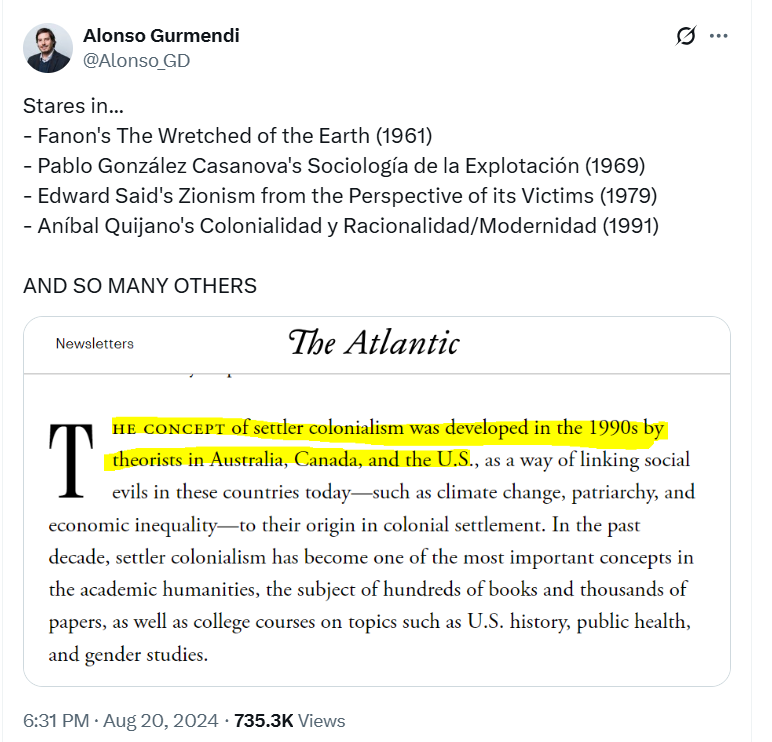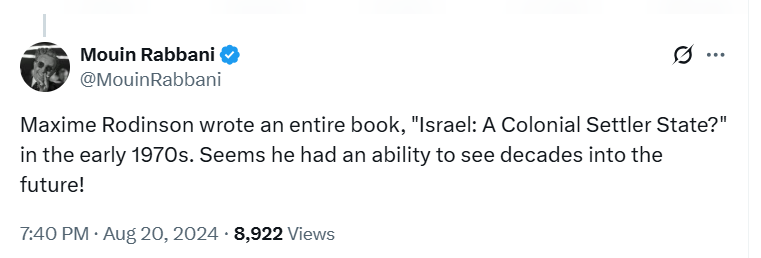Welcome to DU!
The truly grassroots left-of-center political community where regular people, not algorithms, drive the discussions and set the standards.
Join the community:
Create a free account
Support DU (and get rid of ads!):
Become a Star Member
Latest Breaking News
Editorials & Other Articles
General Discussion
The DU Lounge
All Forums
Issue Forums
Culture Forums
Alliance Forums
Region Forums
Support Forums
Help & Search
Adam Kirsch's 'On Settler Colonialism' is an anti-woke screed disguised as serious scholarship.

https://jewishcurrents.org/history-lesson

Palestinian men are harassed during the Nakba, 1948. CPA Media/Alamy

In August 2024, The Atlantic published a slapdash essay by the literary critic Adam Kirsch titled “The False Narrative of Settler Colonialism.” Kirsch claimed that the concept of settler colonialism was developed in the 1990s “as a way of linking social evils in [Australia, Canada, and the United States] today—such as climate change, patriarchy, and economic inequality—to their origin in colonial settlement,” and that it could not possibly be applied to brave little Israel. After all, unlike the US or Australia, Israel’s settlement of a former “province of the Ottoman Empire” did not have continental reach, what with Israel being “about the size of New Jersey,” pluckily bobbing in a hostile sea of Arab states. And whereas settler colonialism is marked by “the destruction of Indigenous peoples and cultures,” Israel, Kirsch insisted, “did not erase or replace the people already living in Palestine.”
The article’s countless errors and elisions quickly attracted widespread derision on social media: Some readers cited examples of scholarship on settler colonialism produced long before the ’90s, while others picked apart Kirsch’s historical inaccuracies about Palestine—for instance, rebutting his minimization of the Nakba by referring to books by Palestinian and Israeli scholars that provide extensive evidence of the mass ethnic cleansing that accompanied the state’s founding. (Kirsch admits in passing that Israel “did displace many” Palestinians, but declines to note the scale of the dispossession—about 750,000 people expelled from about 78% of historic Palestine, their razed towns and villages supplanted by settlements—or clarify how this is distinct from “erasing” or “replacing” them.) Despite the thorough evisceration, Kirsch has since displayed his methodological negligence at a much larger scale: The Atlantic noted that the essay was adapted from a forthcoming book, On Settler Colonialism: Ideology, Violence, and Justice. Much like the capsule-length version, the book, which was published in August, attempts to argue not only that the concept of settler colonialism is so much nonsense in the context of the US or Australia, but that, when applied to Israel, it becomes something far more sinister: antisemitic “ideology,” a word Kirsch seems to apply to any idea with the potential to shape political reality—especially in ways he finds unsettling.

Though its authoritative-seeming title presents the text as the work of an expert, On Settler Colonialism is, to put it mildly, not a scholarly book. If it were, it would have had to acknowledge the broad range of theoretical and empirical research in the fields of history, sociology, and settler colonial studies, instead of fulminating about cherry-picked lines from left-wing scholars—many of them Black or Indigenous—and eliding the contributions of Palestinians. Throughout, Kirsch quotes exclusively in order to excoriate. The summaries of the books and articles he condemns are so bland, vague, and under-specified that they could have been written by ChatGPT. It seems clear that Kirsch harvested some of his citations from his social media critics; for example, the book, unlike the article, quotes the radical French historian Maxime Rodinson, whose work was mentioned in a response to the Atlantic piece by Middle East analyst Mouin Rabbani. Kirsch also appears to have relied on his detractors to correct some of his more obvious mistakes: He moves the origin of the concept of settler colonialism back several decades, to 1976, when Australian scholar Kenneth Good used the term to describe Rhodesia. But Kirsch’s engagement with these lifted sources only underscores his general sloppiness. He misrepresents Rodinson by focusing solely on his plea for the humane treatment of settlers and fails to notice that Good was preceded by Frantz Fanon, Albert Memmi, and dozens of Palestinians.

The word “woke” doesn’t appear in Kirsch’s book, but the text is, in essence, a vitriolic, anti-woke screed. Despite its lack of substance, it is noteworthy as a prime example of the frenzy of negation being undertaken by stalwarts of Israel in legacy media, who have spent the time since the start of Israel’s genocide in Gaza discrediting any scholarship, concept, or idea that could challenge the legitimacy of the state. The Atlantic has put itself forward as the leading platform for such efforts, publishing, in addition to Kirsch’s essay, a jeremiad “against guilty history” by former George W. Bush speechwriter David Frum, in which he argues that “settler colonial should be a description, not an insult,” and whines that contemporary citizens of settler states “owe honor to those who built and secured” their societies; and a piece by Simon Sebag Montefiore, a pop historian of Russia, decrying the “dangerous and false” conception of Israel as an “imperialist-colonialist” entity and disparaging student protesters as the political heirs of “the leftist intellectuals who supported Stalin, and those aristocratic sympathizers and peace activists who excused Hitler.” Such anti-intellectual pablum has also liberally graced the pages of other storied outlets. In The New York Times, France correspondent Roger Cohen similarly deplored the fact that “‘colonial’ is enjoying a field day . . . as an insult, or line of attack,” arguing that in the case of Israel, “the ‘colonizer’ label fails in more ways than it succeeds.” Kirsch himself, writing in The Wall Street Journal, sought to nullify even more terminology, pleading for “retiring” the term “genocide” because it has become “a political flashpoint.”

snip
1 replies
 = new reply since forum marked as read
Highlight:
NoneDon't highlight anything
5 newestHighlight 5 most recent replies
= new reply since forum marked as read
Highlight:
NoneDon't highlight anything
5 newestHighlight 5 most recent replies
Adam Kirsch's 'On Settler Colonialism' is an anti-woke screed disguised as serious scholarship. (Original Post)
Celerity
Jul 23
OP